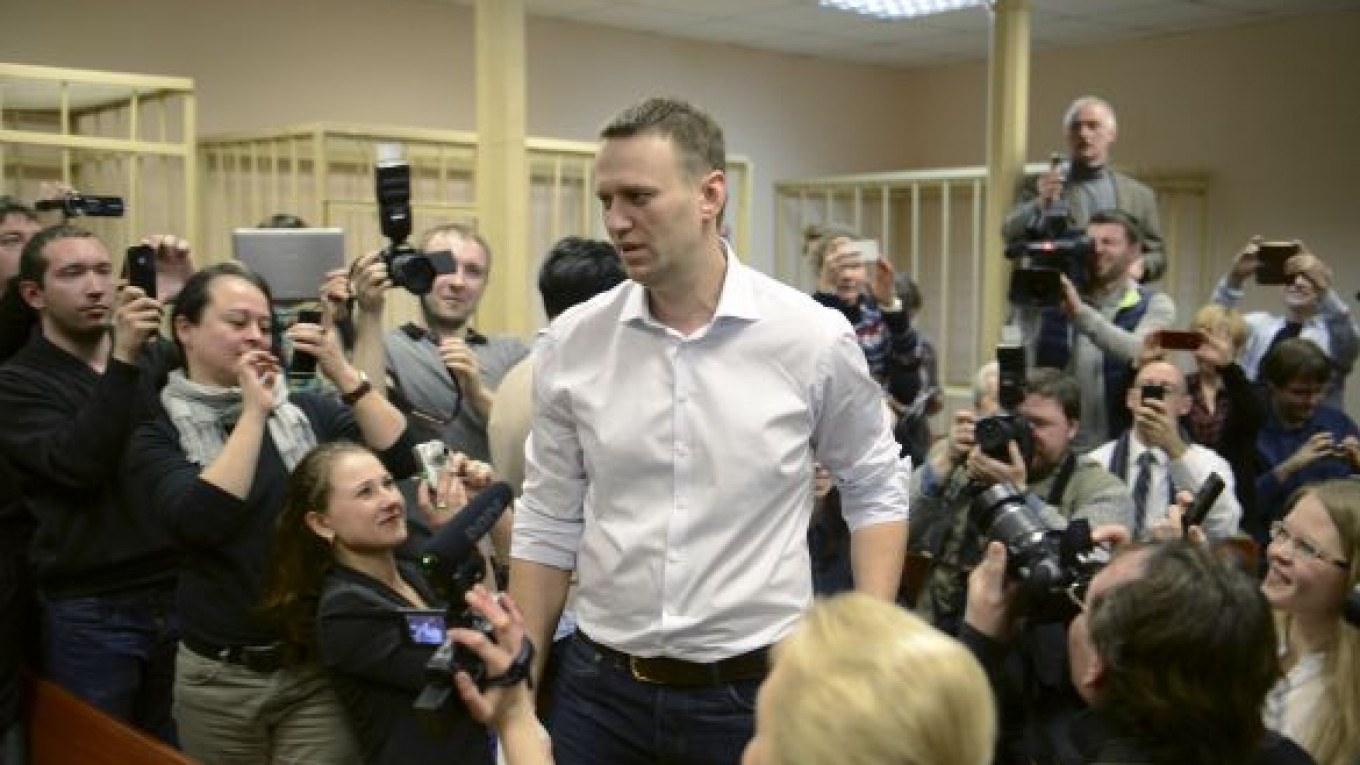The politically charged trial of opposition leader Alexei Navalny opened Wednesday morning in Kirov, only to be adjourned 40 minutes later when the judge agreed to give Navalny and his lawyers another week to study the case. The trial is now scheduled to resume on April 24.
Judge Sergei Blinov's decision was seen as a minor victory for Navalny, whose lawyers had requested an additional month to examine the case file, citing its large size — 29 volumes — problems with the document, and a pending appeal to the Kirov region court.
But the move tried the patience of hordes of journalists and supporters, including top-tier opposition figures Dmitry Gudkov and Boris Nemtsov, many of whom made the 12-hour train ride from Moscow to Kirov, 900 kilometers away, and waited for several hours for the hearing to begin.
The opposition leader gets a minor victory with another week to prepare, but supporters warn a conviction would destroy his liveliehood.
“I feel your disappointment, but we had to do this,” Navalny told journalists on the courthouse steps afterwards, adding that he was “in principle, satisfied” with the judge's decision. He predicted that the government would drag the case out in order to strain the public's attention .
Navalny is accused of masterminding the theft of 16 million rubles ($500,000) worth of timber from a state-owned company while working as an advisor to Kirov region's governor in 2009. He has denied the charge, punishable by up to 10 years in jail, and dismissed the case as politically driven.
Regional investigators have closed the case twice for lack of evidence, only to have it reopened by higher-ups in Moscow, most recently after Navalny accused the country's top investigator, a close Putin ally, of having Czech residency in an embarrassing expose published on his blog.
Navalny, 36, an anti-corruption whistleblower and the street protest movement's most popular leader, faces three other criminal cases, part of a Kremlin campaign to clip his wings, supporters say. Navalny has recently declared presidential ambitions.
As evidence of such a plot, Navalny to a bill approved by the State Duma on Tuesday that would overhaul the elections system and make it illegal for people convicted of grievous crimes — including economic crimes — to run for a seat in the country's lower house of parliament.
Navalny's livelihood is also at stake. A conviction would strip him of his license to practice law, which generated 80 percent of his income last year, according to an income declaration he posted on his blog on Tuesday.
Navalny is the highest-profile opposition leader to go on trial since Soviet times. He enjoys unmatched, albeit far from universal, support within the sputtering protest movement, and scores of supporters converged on Kirov on Wednesday.
They chanted, “The case against Navalny is a case against us all!” outside the courthouse, handed out anti-Putin leaflets to passers-by, and pasted stickers to billboards and street lamps throughout the town that read, “For Navalny. For a Russia without crooks and thieves.”
Back in Moscow, supporters held one-person pickets near Red Square, and hundreds rallied on a central square, some holding portraits of others whom they see as political prisoners, including two jailed members of the punk band Pussy Riot and over a dozen people accused of participating in violent clashes with police at a an opposition march last summer.
"Everyone who came here today knows that Navalny is innocent of the charges that the state has filed against him. But we also know that despite his innocence, he will be convicted," human rights leader and former dissident Lyudmila Alexeyeva, 85, told the crowd.
Navalny, too, has said his conviction is likely, and media have noted that Russian courts have a 99 percent conviction rate, and Judge Blinov, 35, has not acquitted a defendant in his four months as a Kirov city .
Several present at the hearing complained that Blinov spoke so softly that he was inaudible. One annoyed journalist his diction to that of a freshly caught sturgeon.
Wednesday also saw continued speculation over what a guilty verdict could mean for the opposition movement, which has been unable to secure comprehensive democratic reforms despite unprecedented street protests in late 2011 and early 2012.
Boris Akunin, a popular crime novelist and one of the opposition's most prominent intellectuals, wrote on that Navalny's imprisonment would radicalize the movement and signal the government's intention to jail many others, including those linked to the violent rally in May.
If they jail Navalny, the idea of centrism, which people like me have defended this past year and a half, will collapse. … It will vindicate those who foamed at the mouth and told us that that you can't play legal politics with Putin's regime, that white ribbons and bright smiles won't disperse this dark cloud.”
Contact the author at j.earle@imedia.ru
Related articles:
A Message from The Moscow Times:
Dear readers,
We are facing unprecedented challenges. Russia's Prosecutor General's Office has designated The Moscow Times as an "undesirable" organization, criminalizing our work and putting our staff at risk of prosecution. This follows our earlier unjust labeling as a "foreign agent."
These actions are direct attempts to silence independent journalism in Russia. The authorities claim our work "discredits the decisions of the Russian leadership." We see things differently: we strive to provide accurate, unbiased reporting on Russia.
We, the journalists of The Moscow Times, refuse to be silenced. But to continue our work, we need your help.
Your support, no matter how small, makes a world of difference. If you can, please support us monthly starting from just $2. It's quick to set up, and every contribution makes a significant impact.
By supporting The Moscow Times, you're defending open, independent journalism in the face of repression. Thank you for standing with us.
Remind me later.






